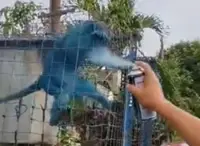Make sure cleaning items are stored in secure cabinets or high shelves that pets cannot access. — YULIYA RUDZKO/Dreamstime/TNS
When you’re busy cleaning, mopping and dusting everything in sight, don’t forget about your dog’s living space as well.
While we’re cleaning, we also need to remember that many common cleaning products may contain ingredients or chemicals that can pose health risks to your pets.
Here are some tips to ensure your pets stay safe while you tackle your spring cleaning.
Many household cleaners contain harsh chemicals that can be harmful and even toxic to pets, causing serious health problems or even death.
Always read the labels on cleaning products and keep pets out of rooms where strong chemicals are being used until the area is completely dry and ventilated.
Ammonia, bleach and phenols (found in some disinfectants) can cause respiratory issues, skin irritation and digestive problems if ingested or inhaled.
Fumes from unevaporated cleaning products, air fresheners and fragrant candles can be problematic for pets, especially those who suffer from respiratory problems such as asthma.
Consider looking at pet-safe, non-toxic cleaners or make your own using simple ingredients like vinegar, baking soda and lemon juice.
Make sure these items are stored in secure cabinets or high shelves that pets cannot access.
If you are using rodenticides or insecticides, ensure they are placed in areas completely out of reach of curious noses and paws.
Some essential oils, including tea tree, eucalyptus and citrus oils, can be dangerous to pets when ingested or even absorbed through their skin. Other cleaning supplies that can be dangerous to your pup include:
* Bleach and toilet bowl cleaners. They can cause stomach issues and corrosion around the mouth, oesophagus and stomach if ingested. It can also cause further problems if splashed in the eye or on the skin.
* Laundry and dishwashing detergent (tablets, pods and powder), soaps and multipurpose cleaners. They can cause vomiting and mouth, throat and gastrointestinal irritation.
* Dishwasher tablets. They can look like treats to pets, but cause vomiting, diarrhoea and burns around the mouth and in the stomach.
* Dryer sheets. They can be very caustic to a dog’s throat and oesophagus.
* Oven and drain cleaners. These are highly caustic and can cause internal tissue damage and chemical burns around the mouth.
* Vacuum cleaners, steam mops and carpet cleaners. They pose an electrical hazard to pets as pets like to chew electric cords.
It’s always worth checking cables and plugs are in good condition to avoid electrocution, and that they’re neatly stored away when not in use.
Now’s a great time to give your pet’s belongings a deep clean to remove dirt, hair and bacteria.
Ideally, you should be cleaning their bowls, bedding and blankets on a routine basis.
If not, now’s a good time to start a regular cleaning regime to keep your pets and your family safe.
These harbour bacteria from food and saliva and should be cleaned at least once a day in hot, soapy water and hopefully followed in a dishwasher on the “sanitise” cycle. Best bowls are those made of stainless steel.
These should be cleaned once a week on a hot cycle in the washing machine. Use a mild, pet-friendly detergent.
These can be cleaned in the washing machine or in hot water with mild detergent. Make sure collars are completely dry before putting back on your pet to avoid bacterial growth.
It’s a good idea to have a spare collar available while the other one is being washed.
Make sure to check the expiration dates on your dog’s food, treats and medications, and get rid of any that have expired.
Along with picking up after your dog, walk around your yard and pick up sticks, stones, branches or anything else your dog may try to chew.
Removing waste is hygienic for you, your dog and your neighbourhood and helps lessen parasite infections as well as rodents.
Don’t forget about veterinary checks and grooming. Get your dog’s vet checkup and vaccines to make sure they are healthy and ready. – Tribune News Service
Dr Jerry Klein is the chief veterinarian for the American Kennel Club. For more information on responsible dog ownership, visit www.akc.org.





